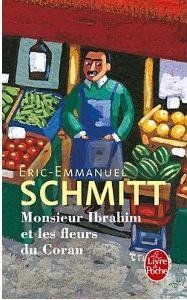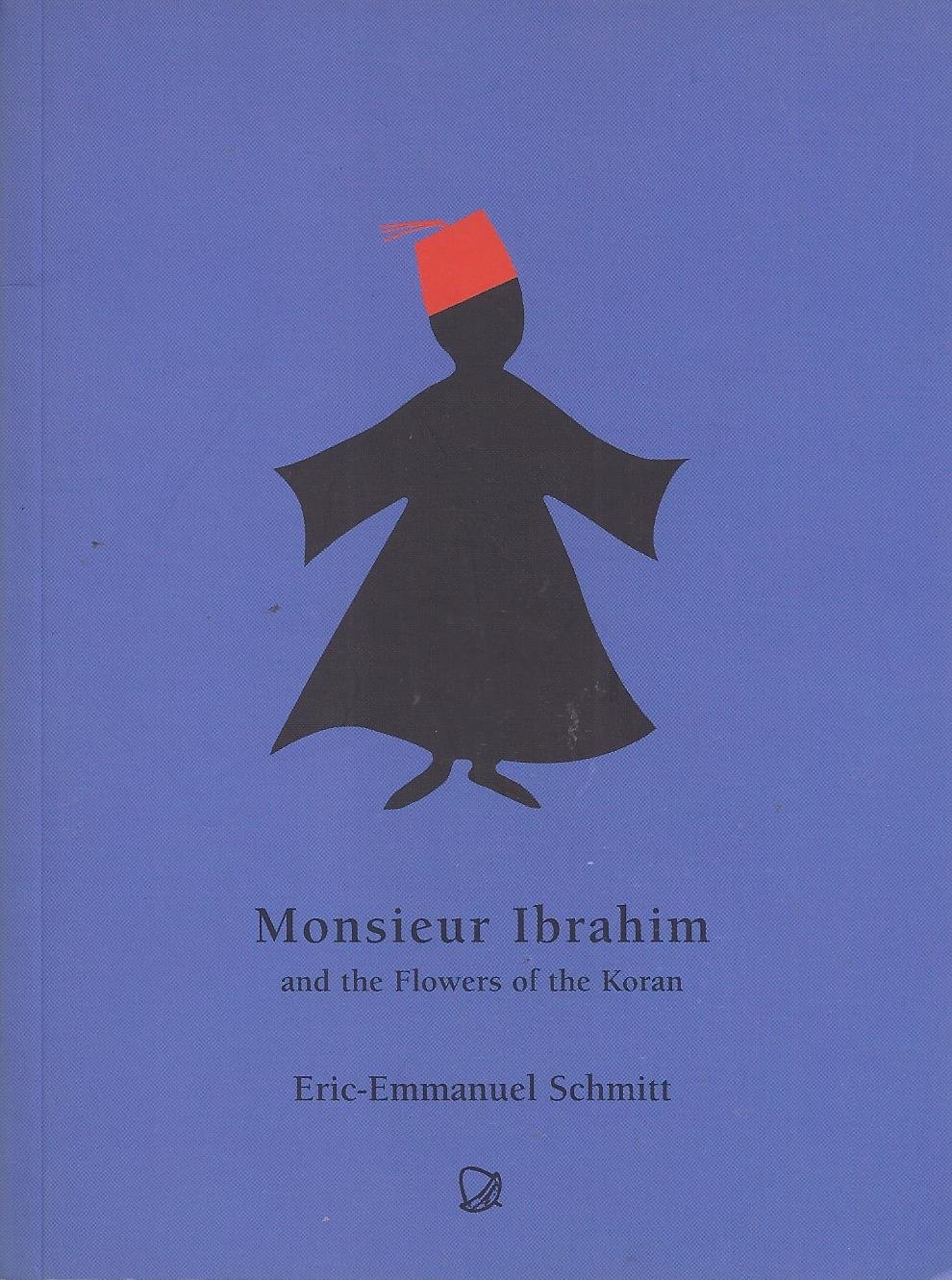Paris, 1960. Moïse, or Momo as he is usually called, is a Jewish boy that grows up in a rather loveless household. Mother and an older brother, Popol, have left soon after Momo’s birth and left the baby-boy with the father, a lawyer, that is hardly ever communicating with his son (or anybody else), except for the cases when he is suspecting Momo to steal money from the funds from which he is supposed to buy the household supplies.
At 13, Momo is getting interested in the other sex, and so the short novella Monsieur Ibrahim and the Flowers of the Koran starts with him crashing his piggy bank and using the savings for a first visit at a prostitute. The real centre of the story however is the slowly developing friendship with Monsieur Ibrahim, the Arab of the predominantly Jewish neighbourhood, where Momo is buying (and sometimes stealing) his supplies.
While at the beginning they exchange usually only one sentence every day, over a longer period they become closer and the ever-smiling Monsieur Ibrahim, an elderly man who is rarely ever seen leaving his shop, is beginning to share his view of life with the boy who is looking for answers, answers that usually a father is supposed to provide if possible – but on the one occasion Momo is looking for a serious talk with his father, he realizes that his old man is a broken man, unable to even make sense of his own life. Something terrible happened in the life of Momo’s father, and it is only after Monsieur Ibrahim, a true Sufi, explains it to him at a later stage, Momo begins to understand that his twice being deserted by mother and father alike is not his own fault, of course. He is in a way suffering because he too is a victim of the holocaust – his life is tremendously affected by the consequences of this great crime, although he is born after WWII.
I don’t want to give away the whole story but rather dramatic developments are still ahead of Momo. At a bit below 70 pages in print, this book is a fast read, so you can easily go through it in a few hours.
A friendship between a Jewish boy and an Arab in Paris – I think the author realized that he had to tell us this story in the past tense. By placing his story in the early 1960s he makes this friendship more probable; at the same time this past is a bit like a lost Utopia where people that belong to different religions learn to accept each other and even become true friends for life. And on a more symbolic level – the protagonists’s name derive from Abraham and Moses – it is also a book about the fact that the followers of the big monotheistic religions share in the end much more than many of the legalistic interpreters of these cults want to know nowadays.
“Avec monsieur Ibrahim, je me rendais compte que les juifs, les musulmans et même les chrétiens, ils avaient plus de grands hommes en commun avant de se taper sur la gueule. Ça ne me regardait pas, mais ça me faisait du bien.” – (With Monsieur Ibrahim, I realized that the Jews, the Muslims, and even the Christians had more great men in common before they were hitting each other’s faces. It had nothing to do with me, but it made me feel good.)
Eric-Emmanuel Schmitt is a popular and very prolific French-Belgian author of bestsellers. I didn’t expect very much from the book but was pleasantly surprised. Since I decided to read again more French books in their original language, it was also a test if I can still do it – it went well and I will tackle also some longer and more complex works in French again in the future.
It is said that the book is inspired by Romain Gary’s The Life Before Us – I haven’t read Gary’s book yet and can therefore not comment on this aspect.
By the way, there is a movie with the same title with Omar Sharif in the title role – probably his best performance of his later career.


Eric-Emmanuel Schmitt: Monsieur Ibrahim and the Flowers of the Koran, translated by Marjolijn De Jager, Acorn 2004; Monsieur Ibrahim et les Fleurs du Coran, Albin Michel 2014
The above quote from the French edition is translated by Thomas Hübner.
© Thomas Hübner and mytwostotinki.com, 2014-6. Unauthorized use and/or duplication of this material without expressed and written permission from this blog’s author and/or owner is strictly prohibited. Excerpts and links may be used, provided that full and clear credit is given to Thomas Hübner and mytwostotinki.com with appropriate and specific direction to the original content.



 Facebook
Facebook RSS
RSS Twitter
Twitter
I have an idea this has been made into a film – is that right? I really enjoyed your comment about why the novel was set in the past.
If you want to read more in French without having to struggle too hard I can highly recommend Andre Gide.
Thanks for the recommendation! We read Gide in French classes in school and I remember he was fairly easy to read indeed. Now I have Marguerite Yourcenar’s Le coup de grâce and a book by Fred Vargas in French on my TBR list. More French books to come.
The movie is with Omar Sharif in the role of Monsieur Ibrahim – worth watching!